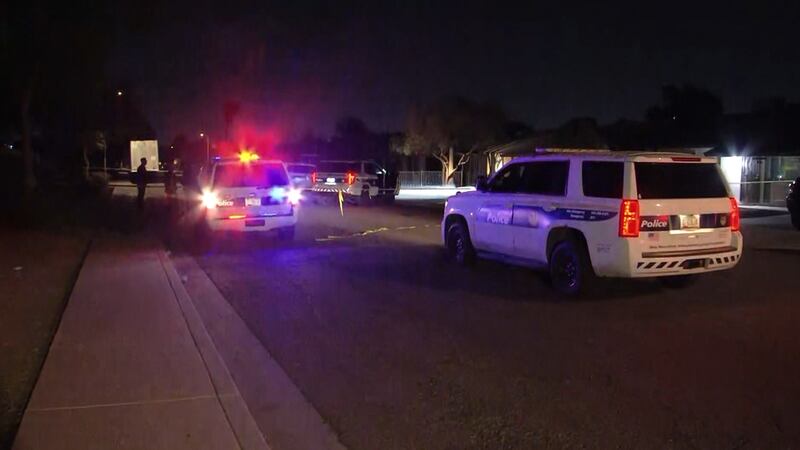At the US-Mexico border, volunteers leave water along migrant routes to save lives
YUMA, AZ (AZFamily) — Every year, hundreds of undocumented people make the dangerous trek to the United States and cross through some of the harshest terrain along the U.S.-Mexico Border.
At least 90 undocumented border crossers have died this year attempting to cross into the Arizona desert.
The Pima County Office of the Medical Examiner tracks these deaths., which estimates a third of them were heat-related deaths.
A group of volunteers with Border Kindness is hoping to prevent migrant deaths by leaving life-saving supplies out in the desert.
The nonprofit helps migrants and families get resources and guide them through their asylum claims. Their water drop team also conducts weekly drops along the California and Mexico border.
“From the mountains of San Diego County all the way to where we are right now close to the Arizona border, we cover that whole ground and leave food, water, and clothing, depending on the season,” said James Cordero, who has organized water drops for eight years.
On Saturday, Cordero and about eight volunteers traveled three hours east to the California-Arizona border, an area patrolled by the U.S. Border Patrol’s Yuma sector.
To cover more ground, they split up into groups. Each volunteer carries a backpack filled with supplies and hikes into the desert.
“We have water, cans of food, hats for the sun,” said Luis Osuna, a volunteer.
Osuna packed his backpack with as many supplies as he could carry.
“More than anything we want to put these life saving items in people’s way,” said Osuna.
Osuna said he tries to get out to the desert at least twice a month.
“Everything we do out here is to try and prevent one death. Because one death means the world to someone’s family members , to someone’s kids,” said Osuna.
Temperatures have reached 110 degrees. It’s not the ideal climate, but volunteers said this is when the supplies are needed most.
“We could be out here when it’s a lot cooler , but that’s not when it’s needed,” said Cordero.
Cordero said they start preparing for water drops weeks before summer starts.
“As soon as the weather starts getting warmer. That’s when we start scheduling and planning, while we can still get out far enough, because in summer time we are limited to how much we can hike,” said Cordero.
“A lot of it is just test drop sites and leaving the supplies there and we’ll come back in a little bit in a month or two and kind of see if stuff has been taken and go from there,” said Cordero.
During Saturday’s hike, Cordero was looking for signs of foot traffic.
“We know this is a place people come through, see there’s another water bottle right here. We collect this plastic because we want to make sure we’re helping the environment as well,” said Cordero.
He found clothing, a backpack, and water bottles left behind. These are all signs that someone crossed through the area at some point.
“Where we are standing right now the only ones that would be in this location are migrants crossing through, us , and border patrol,” Cordero said.
Unlawful crossings by migrants along the U.S. Southern Border dropped for the fifth consecutive month in July.
Border officials are relating the decrease to Biden’s executive order, which was signed in June and placed harsher restrictions on asylum seekers.
Cordero said it’s still too new of a policy to connect it to anything.
“Now if this were to last a long time, then yeah you can probably connect past years to this year and see the difference,” Cordero said.
Border officials continue to push for CBP One, the mobile application that allows people to apply for asylum.
“There’s gonna be those that do not have any types of paths for legal status in the United States. Therefore they take to these remote regions between ports of entry. Going over fences swimming across canals,” said Cordero.
Cordero said foot traffic along the border has changed a lot due to organized crime south of the U.S.
Because of this, they have to be more strategic with where they are leaving supplies.
“It doesn’t seem like people are not crossing through without permission. We are chasing where we can leave supplies and we’re trying to find where the movement is going,” Cordero said.
Cordero said they’re focused on hitting crucial drop sites as temperatures remain in the triple digits. However, their work will continue into the winter months.
“We know that what we do works. You leave supplies out, people use them, they’re not dying as much,” Cordero said.
Cordero said donations to Border Kindness help fund their weekly water drops. Additionally, they also need volunteers who are willing and able to hike in the desert and mountain terrain.
“This is about caring for people and caring for a stranger is one of the most revolutionary acts a person can do,” said Cordero.
See a spelling or grammatical error in our story? Please click here to report it.
Do you have a photo or video of a breaking news story? Send it to us here with a brief description.
Copyright 2024 KTVK/KPHO. All rights reserved.










